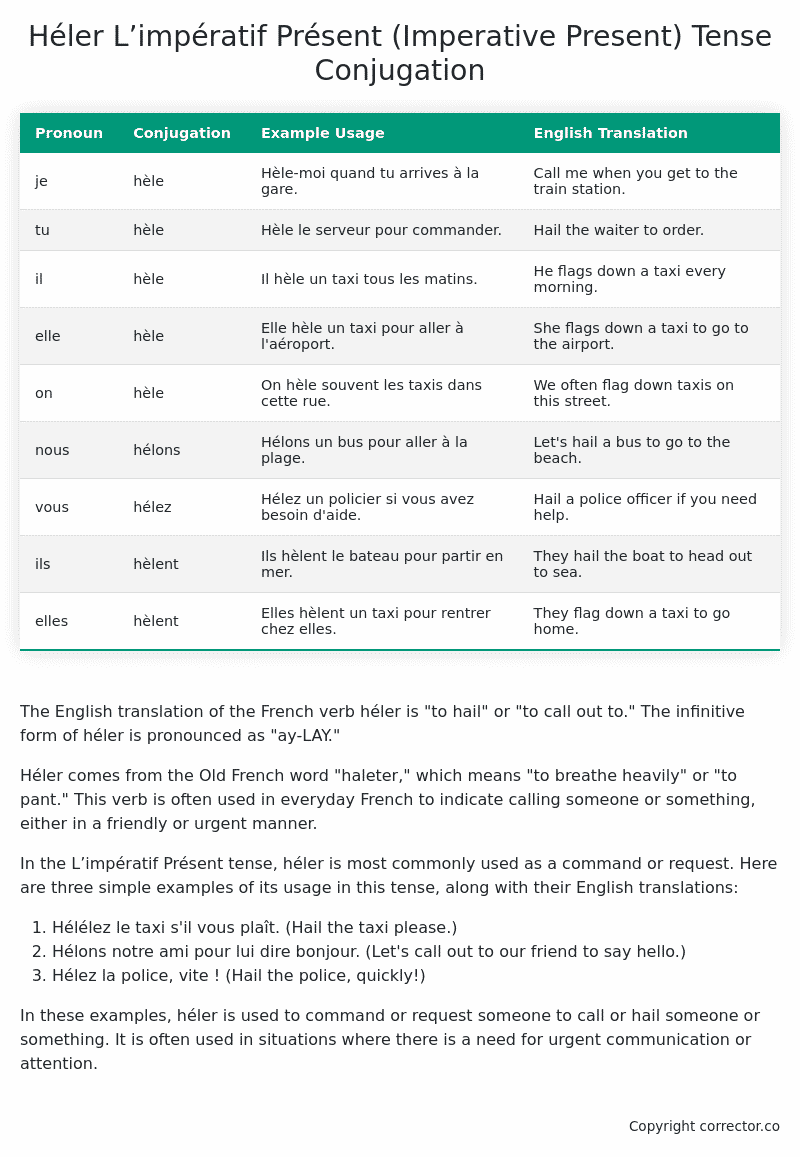L’impératif Présent (Imperative Present) Tense Conjugation of the French Verb héler
Introduction to the verb héler
The English translation of the French verb héler is “to hail” or “to call out to.” The infinitive form of héler is pronounced as “ay-LAY.”
Héler comes from the Old French word “haleter,” which means “to breathe heavily” or “to pant.” This verb is often used in everyday French to indicate calling someone or something, either in a friendly or urgent manner.
In the L’impératif Présent tense, héler is most commonly used as a command or request. Here are three simple examples of its usage in this tense, along with their English translations:
- Hélélez le taxi s’il vous plaît. (Hail the taxi please.)
- Hélons notre ami pour lui dire bonjour. (Let’s call out to our friend to say hello.)
- Hélez la police, vite ! (Hail the police, quickly!)
In these examples, héler is used to command or request someone to call or hail someone or something. It is often used in situations where there is a need for urgent communication or attention.
Table of the L’impératif Présent (Imperative Present) Tense Conjugation of héler
| Pronoun | Conjugation | Example Usage | English Translation |
|---|---|---|---|
| je | hèle | Hèle-moi quand tu arrives à la gare. | Call me when you get to the train station. |
| tu | hèle | Hèle le serveur pour commander. | Hail the waiter to order. |
| il | hèle | Il hèle un taxi tous les matins. | He flags down a taxi every morning. |
| elle | hèle | Elle hèle un taxi pour aller à l’aéroport. | She flags down a taxi to go to the airport. |
| on | hèle | On hèle souvent les taxis dans cette rue. | We often flag down taxis on this street. |
| nous | hélons | Hélons un bus pour aller à la plage. | Let’s hail a bus to go to the beach. |
| vous | hélez | Hélez un policier si vous avez besoin d’aide. | Hail a police officer if you need help. |
| ils | hèlent | Ils hèlent le bateau pour partir en mer. | They hail the boat to head out to sea. |
| elles | hèlent | Elles hèlent un taxi pour rentrer chez elles. | They flag down a taxi to go home. |
Other Conjugations for Héler.
Le Present (Present Tense) Conjugation of the French Verb héler
Imparfait (Imperfect) Tense Conjugation of the French Verb héler
Passé Simple (Simple Past) Tense Conjugation of the French Verb héler
Passé Composé (Present Perfect) Tense Conjugation of the French Verb héler
Futur Simple (Simple Future) Tense Conjugation of the French Verb héler
Futur Proche (Near Future) Tense Conjugation of the French Verb héler
Plus-que-parfait (Pluperfect) Tense Conjugation of the French Verb héler
Passé Antérieur (Past Anterior) Tense Conjugation of the French Verb héler
Futur Antérieur (Future Anterior) Tense Conjugation of the French Verb héler
Subjonctif Présent (Subjunctive Present) Tense Conjugation of the French Verb héler
Subjonctif Passé (Subjunctive Past) Tense Conjugation of the French Verb héler
Subjonctif Imparfait (Subjunctive Imperfect) Tense Conjugation of the French Verb héler
Subjonctif Plus-que-parfait (Subjunctive Pluperfect) Tense Conjugation of the French Verb héler
Conditionnel Présent (Conditional Present) Tense Conjugation of the French Verb héler
Conditionnel Passé (Conditional Past) Tense Conjugation of the French Verb héler
L’impératif Présent (Imperative Present) Tense Conjugation of the French Verb héler (this article)
L’infinitif Présent (Infinitive Present) Tense Conjugation of the French Verb héler
Struggling with French verbs or the language in general? Why not use our free French Grammar Checker – no registration required!
Get a FREE Download Study Sheet of this Conjugation 🔥
Simply right click the image below, click “save image” and get your free reference for the héler L’impératif Présent tense conjugation!

Héler – About the French L’impératif Présent (Imperative Present) Tense
Usage
Giving commands
Making requests
Offering advice
Expressing desires
Conjugation Formation
Interactions with other tenses
Want More?
I hope you enjoyed this article on the verb héler. Still in a learning mood? Check out another TOTALLY random French verb conjugation!


